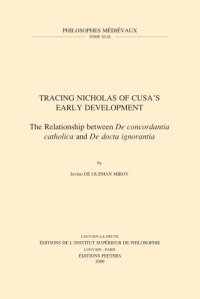
Ebook: Tracing Nicholas of Cusa’s Early Development: The Relationship between De concordantia catholica and De docta ignorantia
Author: Miroy J De Guzman
- Tags: Church History, Churches & Church Leadership, History, Biblical History & Culture, Church History, Historical Theology, Religious, Leaders & Notable People, Biographies & Memoirs, Philosophers, Professionals & Academics, Biographies & Memoirs, Medieval, Movements & Periods, History & Criticism, Literature & Fiction, Words Language & Grammar, Alphabet, Communication, Etymology, Grammar, Handwriting, Linguistics, Phonetics & Phonics, Public Speaking, Reading Skills, Reference, Rhetoric, Semantics, Sign Language, Speech, Spelli
- Series: Philosophes Medievaux
- Year: 2009
- Publisher: Peeters
- Edition: 0
- Language: English
- pdf
The history of philosophy has painted two differing, if not contradictory, images of Nicholas of Cusa. He was hitherto considered either as a mystical theologian or as a political philsopher. This book is a comparative study of the two great works that have generated these divergent representations of the 15th century German thinker, namely De concordantia catholica and De docta ignorantia. The study yields an understanding of the continuity and discontinuity in the thinking of the Cusanus of the Council of Basel and that of the post-Basel period. This book also provides details that are necessary to offer a unified as well as a dynamic thought, which is of vital importance to argue for the continued relevance of medieval thought in contemporary times
Download the book Tracing Nicholas of Cusa’s Early Development: The Relationship between De concordantia catholica and De docta ignorantia for free or read online
Continue reading on any device:

Last viewed books
Related books
{related-news}
Comments (0)